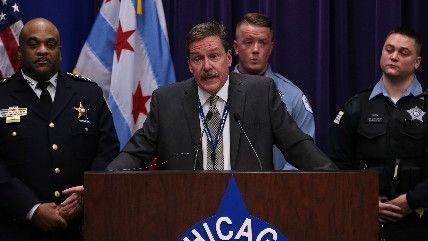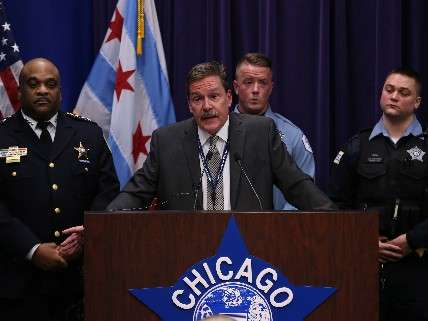Chicago's Police Union Forces Department to Back Down on Use of Force Policy
Police union fears teaching officers to prioritize de-escalation would endanger their lives.


The Chicago Police Department appears to be backing down after a confrontation with its police union over new use of force policies.
A newly released draft of the relevant policy differs from a previous draft released in October in that it removes a requirement for "all other reasonable alternatives [to] have been exhausted" before officers would be permitted to initiate force, according to the Associated Press, which also reports that the Chicago Fraternal Order of Police (FOP) was concerned that the proposed policy was "too restrictive and would endanger officers who need to protect themselves in various situations."
The new draft stipulates, "The requirement that officers apply de-escalation principles does not mean officers must endanger themselves."
Dean Angelo, president of the police union, told Chicagoist that he supports the use-of-force changes and said they reflect the wishes and concerns of rank-and-file police officers who thought the previous language was potentially dangerous in its vagueness. "It's nice to see it trimmed down and [lose] some of the language we believe was not forwarded by police—[language that was] more about community or politics. And officers will have a little bit more idea about what they should or should not be doing."
"I need to make sure our officers go home," Angelo told Chicagoist. "I don't care what the activist says, or what the ACLU says. We know when to display and when to holster, and we're the best at determining those." Angelo said that he believes that previous language reflected external political pressure but declined to say what persons or groups may have been responsible in this specific instance.
Chiacgo's police union is notoriously intransigent when it comes to almost any meaningful reform measures or efforts to increase transparency. The FOP has filed lawsuits to keep police misconduct records from being made public, arguing that its officers would suffer "irreparable injury" and "public humiliation and loss of prestige in their employment" if such information were ever to be made available to the citizens they police. The Chicago FOP has also sued to keep information about the systemic torture and abuse conducted for two decades by officers under the command of now-imprisoned former Chicago PD commander Jon Burge from ever seeing the light of day.
On that front, the union ultimately failed, and the Chicago Police Torture Archive will be fully available online later this year.


Show Comments (8)